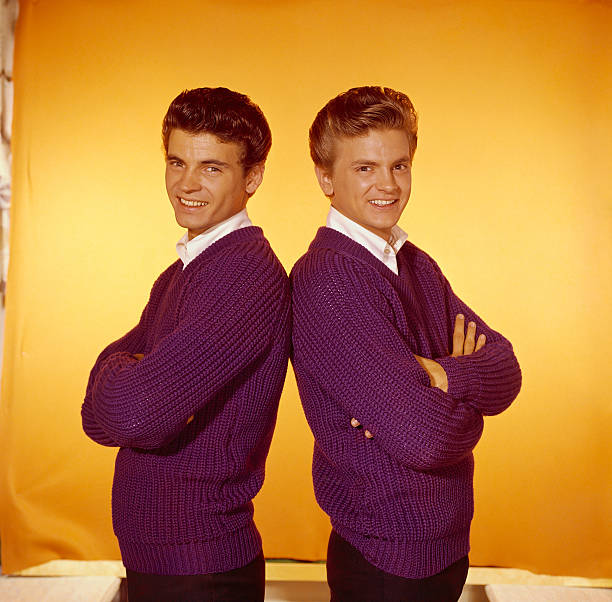 Introduction and Short Summary of the Song
Introduction and Short Summary of the Song
“Barbara Allen” is The Everly Brothers’ rendition of one of the oldest and most enduring folk ballads in the English-speaking world. Recorded for their 1958 album Songs Our Daddy Taught Us, the song reflects the duo’s deep respect for traditional folk music and their ability to breathe new life into ancient material. Unlike their chart-topping hits like “Bye Bye Love” or “All I Have to Do Is Dream,” “Barbara Allen” is somber and stripped-down, focusing on narrative storytelling, haunting harmonies, and a centuries-old tale of tragic love. The Everlys’ version highlights the timeless appeal of the ballad while showcasing their roots in Appalachian and folk traditions.
Origins of the Song
The ballad of “Barbara Allen” dates back to at least the 17th century, with one of its earliest known mentions appearing in Samuel Pepys’s diary in 1666. It was carried through generations via oral tradition in England, Scotland, and Ireland before making its way to America with settlers. Over time, countless variations emerged across the British Isles and Appalachia, each retelling the tragic story with slight differences in phrasing and imagery.
---> Scroll down for the VIDEO
By the mid-20th century, “Barbara Allen” had become one of the most collected and studied folk songs, emblematic of the enduring power of oral tradition. The Everly Brothers, raised in a family steeped in country, gospel, and folk traditions, were exposed to songs like this from childhood. Including it on Songs Our Daddy Taught Us was a way of honoring their roots and preserving a piece of folk history.
Why The Everly Brothers Released “Barbara Allen”
The Everly Brothers released “Barbara Allen” as part of Songs Our Daddy Taught Us to pay homage to the music they grew up with. Unlike their earlier hits, this album was not designed for radio play or commercial success. Instead, it was a personal project, showcasing traditional folk ballads their father, Ike Everly, had introduced to them as children.
---> Scroll down for the VIDEO
“Barbara Allen” was a natural choice because it is one of the most iconic love ballads in folk history. By recording it, Don and Phil Everly aligned themselves with a centuries-old tradition while also demonstrating their versatility as artists beyond rock-and-roll chart success.
The Message Conveyed in the Song
At its heart, “Barbara Allen” is a tragic love story. The ballad tells of a young man who falls gravely ill because of his unrequited love for Barbara Allen. When she rejects him or comes too late to his side, he dies of heartbreak. Barbara Allen, stricken by guilt and grief, soon follows him to the grave.
Key themes include:
-
Tragic Love: The destructive power of unfulfilled love.
-
Mortality: Death looms as the ultimate consequence of heartbreak.
-
Guilt and Regret: Barbara Allen realizes too late the depth of her feelings.
-
Folk Tradition: A timeless story retold across generations with moral and emotional weight.
The Everly Brothers’ performance emphasizes the stark inevitability of the story, underscoring how love and loss are universal experiences.
The Recording and Musical Characteristics
The Everly Brothers’ version of “Barbara Allen” is hauntingly simple, emphasizing the narrative rather than musical ornamentation.
-
Vocals: Don and Phil Everly deliver close, mournful harmonies that enhance the ballad’s tragic mood. Their voices blend with an almost ghostly quality, perfect for the song’s subject.
-
Instrumentation: Sparse acoustic guitar accompaniment provides a gentle, steady backdrop, leaving the focus squarely on the story and harmonies.
-
Mood: Somber, haunting, and reverent.
-
Style: Rooted in traditional folk, stripped of rock-and-roll energy, and presented with authenticity.
This minimalism highlights the song’s timelessness, making it sound as though it could have been sung centuries earlier around a fire or in a rural cabin.
Cultural and Commercial Impact
Commercially, Songs Our Daddy Taught Us was not a hit record. Released at a time when fans expected upbeat rock-and-roll singles, the collection of stark, traditional folk ballads confused some listeners. However, the project earned respect for its sincerity and its preservation of folk traditions.
Culturally, “Barbara Allen” has always held significance as a quintessential folk ballad. The Everly Brothers’ version contributed to the song’s longevity by introducing it to a new generation of listeners in the 1950s. Their interpretation helped bridge the gap between folk tradition and mainstream music, paving the way for the folk revival of the 1960s led by artists like Joan Baez and Bob Dylan.
Legacy of “Barbara Allen”
Today, “Barbara Allen” remains one of the most famous traditional ballads in the English-speaking world. The Everly Brothers’ version is not the only interpretation, but it is notable for its sincerity, starkness, and beauty. It stands as a reminder of the duo’s roots in folk and country traditions, showing that they were more than just pop idols—they were interpreters of timeless stories.
For The Everly Brothers’ legacy, the track underscores their versatility. While they are most often celebrated for shaping the sound of early rock and roll, their work on Songs Our Daddy Taught Us revealed their respect for tradition and their ability to elevate simple, old songs into works of haunting beauty.
More broadly, the song’s inclusion in their catalog highlights the continuity between folk ballads of centuries past and the popular music of the 20th century. By recording “Barbara Allen,” the Everlys acted as cultural custodians, preserving a vital piece of musical history for future generations.
Over six decades later, their version of “Barbara Allen” still resonates with its stark, tragic beauty. It stands as one of the most haunting tracks in their catalog, a quiet but powerful testament to the Everly Brothers’ artistry and their deep connection to folk tradition.